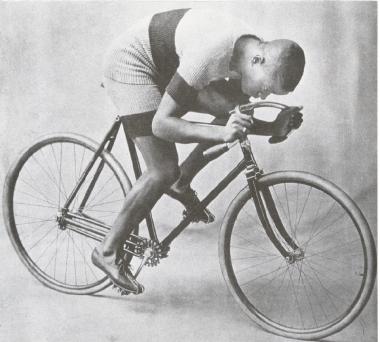
In 1899, cyclist Marshall Walter Taylor (1878–1932), better known as Major Taylor and also known as the Worcester Whirlwind, became the first black world cycling champion and, later that same year, by amassing points on a national circuit of races, became the League of American Wheelman national sprint champion. For twelve years, he was the world’s fastest bicycle racer. Born near Indianapolis, Indiana, to black parents, he was later raised and educated in the home of a wealthy white Indianapolis businessman who employed Major's father as a coachman. When the family gave him a bicycle, he not only learned to ride it well, he taught himself tricks on the bike and entertained his friends. When word of the cycling tricks spread, an Indianapolis bicycle shop owner hired him to perform tricks outside the shop to attract customers. For a costume, he wore a soldier's uniform, which is how he became known as Major Taylor. In 1895, when his employer and racing manager, Louis "Birdie" Munger, moved to Worcester, Massachusetts, to open a bicycle factory, Major moved with him. Although he was the fastest bicyclist for twelve years during his racing career, he endured racial slurs, being banned from events, and being treated inhumanely by white crowds who threw things at him while he was racing. Success did not follow him after he retired at age 32, with failed business ventures and illness leaving him destitute. He died at age 53 in the charity ward of Cook County Hospital in Chicago, Illinois, and was buried in an unmarked grave. In 1948, a group of retired professional bicycle racers used money donated by Frank Schwinn, owner of the Schwinn Bicycle Company, to exhume his body and rebury it in a more prominent location in the Mount Glenwood Cemetery in Illinois. A street in Worcester, Massachusetts, Major Taylor Boulevard, honors the man and his success, and a statue of Major welcomes visitors to the Worcester Public Library. In 1989, he was posthumously inducted into the U.S. Bicycling Hall of Fame in the category Veteran Road & Track Competitor (Pre-1945). The Major Taylor Association in Worcester, dedicated to "recognizing sportsmanship, promoting nonviolence and caring for those less fortunate," was established to keep Major's story alive and to provide opportunities for bicyclists.




